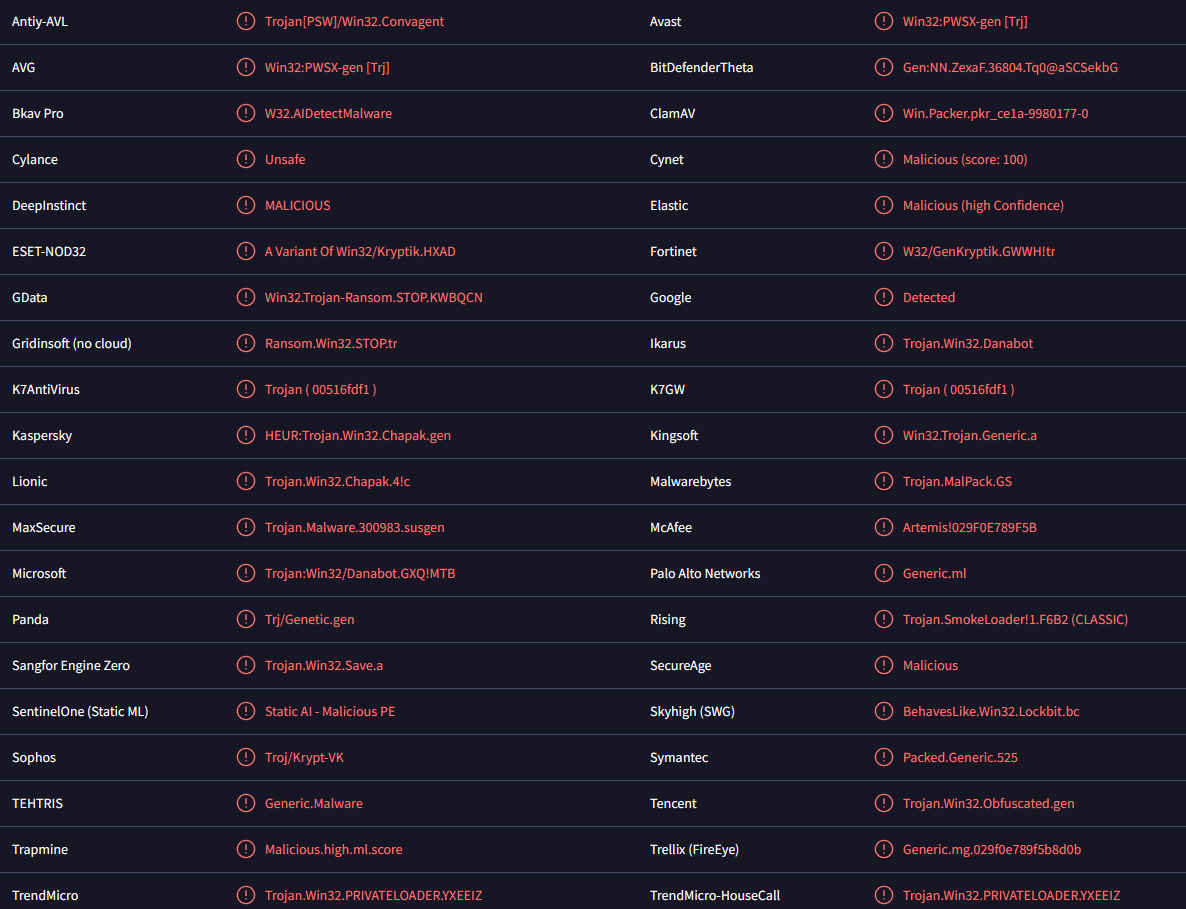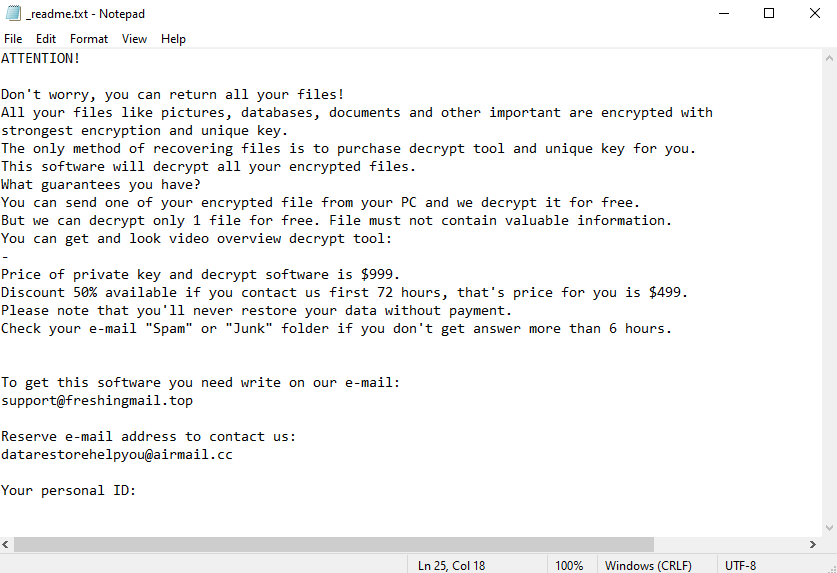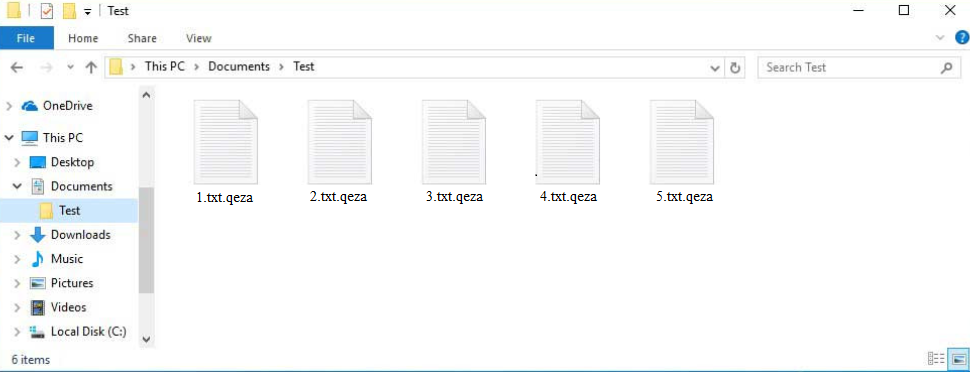Delete Qeza ransomware
Qeza ransomware is file-encrypting malware. It’s classified as a very dangerous infection because it encrypts personal files and it’s not always possible to get them back. Qeza ransomware belongs to the Djvu/STOP ransomware family. The cybercriminals operating this malware release new versions regularly.
When the ransomware is initiated, it begins encrypting files immediately. The main files it targets are personal files that users hold most important, including documents, videos, and photos. You will be able to tell which files have been encrypted because file names will have .qeza added to them. For example, 1.txt would become 1.txt.qeza when encrypted. You will not be able to open any files that have this extension unless you first decrypt them.
When all targeted files are encrypted, you will find a _readme.txt ransom note. The note explains that users can recover files if they purchase a decryptor. According to the note, the decryptor costs $999 but there’s a 50% discount if victims make contact with the cybercriminals within the first 72 hours. The cybercriminals also promise to decrypt one file for free as proof as long as it does not contain important information.
While paying the ransom may seem like a good idea if you don’t have backup, it’s not recommended. Even if you pay the ransom, you are not guaranteed a decryptor because the malicious actors will not necessarily send it. Keep in mind that you are dealing with cybercriminals and there’s nothing to force them to keep their end of the deal. Many victims have not received their decryptors despite paying.
Below is the full _readme.txt ransom note:
ATTENTION!
Don’t worry, you can return all your files!
All your files like pictures, databases, documents and other important are encrypted with strongest encryption and unique key.
The only method of recovering files is to purchase decrypt tool and unique key for you.
This software will decrypt all your encrypted files.
What guarantees you have?
You can send one of your encrypted file from your PC and we decrypt it for free.
But we can decrypt only 1 file for free. File must not contain valuable information.
You can get and look video overview decrypt tool:
–
Price of private key and decrypt software is $999.
Discount 50% available if you contact us first 72 hours, that’s price for you is $499.
Please note that you’ll never restore your data without payment.
Check your e-mail “Spam” or “Junk” folder if you don’t get answer more than 6 hours.To get this software you need write on our e-mail:
support@freshingmail.topReserve e-mail address to contact us:
datarestorehelpyou@airmail.ccYour personal ID:
If you have a backup, you can easily recover your files. However, do not connect to your backup before you fully remove Qeza ransomware from your computer. Use a good anti-malware program to delete Qeza ransomware instead of trying to do it manually. Manual Qeza ransomware removal could lead to more damage to the computer.
How did ransomware infect your computer?
The ransomware was able to infect your computer because you opened a malicious file. These malicious files can be found in torrents, emails as attachments, etc. If you have bad browsing habits, you’re much more likely to pick up an infection because you engage in risky behavior. Developing better habits and becoming familiar with the most common malware distribution method is an effective method to avoid malware infection.
Malware is commonly distributed via email attachments. If your email address has been leaked or stolen during a data breach, you’re more likely to receive malicious emails. The emails can be disguised as a parcel delivery notification or some kind of order confirmation. The senders also pressure users into opening the attachments by claiming they’re important documents that need to be reviewed. Fortunately, malicious emails are usually very obvious. The most obvious sign is grammar/spelling mistakes. For whatever reason, malicious emails are always full of mistakes, the kind that you would not see in legitimate emails.
When inspecting an email, take note of how it addresses you. If the sender is someone who should know your name (e.g. a company whose service you use) but they address you using generic words like “User”, “Member”, “Customer”, etc., to address you, you may be dealing with either spam or a malicious email. Cybercriminals target many users with the same email so they use generic language. They also usually do not have access to personal information.
If cybercriminals target a specific user, the malicious email would be significantly more sophisticated. For one, they would be free of all mistakes. They would also contain certain information to make the email seem more credible. Cybercriminals also usually have access to personal information. This is why it’s recommended to scan all unsolicited email attachments with anti-virus software or VirusTotal.
Torrents are a common malware distribution method as well. Many torrent sites are poorly moderated, which means they are full of malware. Furthermore, many users are not aware of what malware in a torrent looks like. It’s particularly common to find malware in torrents for entertainment content, such as movies, TV series, or video games. If you choose to pirate copyrighted content, keep in mind that you’re not only stealing content but also endangering your computer and data.
How to remove Qeza ransomware
It’s a very complex infection, thus it’s recommended to use anti-malware software to remove Qeza ransomware. Unless you know exactly what to do, you should not try to delete Qeza ransomware manually because you could end up causing even more damage accidentally. When your anti-malware program no longer detects Qeza ransomware, you can connect to your backup and start recovering files.
Can I recover Qeza ransomware-encrypted files for free?
Only users who have backups can recover files for free. Unfortunately, if you do not have a backup, your only option is to wait for a free Qeza ransomware decryptor to be released. It’s not currently available but it may be released in the future. If it does get released, you will be able to find it on NoMoreRansom. Ransomware from the Djuv/STOP ransomware family is very difficult to crack for malware researchers so there’s only one decryptor available and it only decrypts files encrypted with older versions.
Qeza ransomware is also detected as:
- Win32:PWSX-gen [Trj] by Avast/AVG
- A Variant Of Win32/Kryptik.HXAD by ESET
- HEUR:Trojan.Win32.Chapak.gen by Kaspersky
- Trojan:Win32/Danabot.GXQ!MTB by Microsoft
- Trojan.Win32.PRIVATELOADER.YXEEIZ by TrendMicro
- Trojan.MalPack.GS by Malwarebytes
- Artemis!029F0E789F5B by McAfee

Site Disclaimer
WiperSoft.com is not sponsored, affiliated, linked to or owned by malware developers or distributors that are referred to in this article. The article does NOT endorse or promote malicious programs. The intention behind it is to present useful information that will help users to detect and eliminate malware from their computer by using WiperSoft and/or the manual removal guide.
The article should only be used for educational purposes. If you follow the instructions provided in the article, you agree to be bound by this disclaimer. We do not guarantee that the article will aid you in completely removing the malware from your PC. Malicious programs are constantly developing, which is why it is not always easy or possible to clean the computer by using only the manual removal guide.


